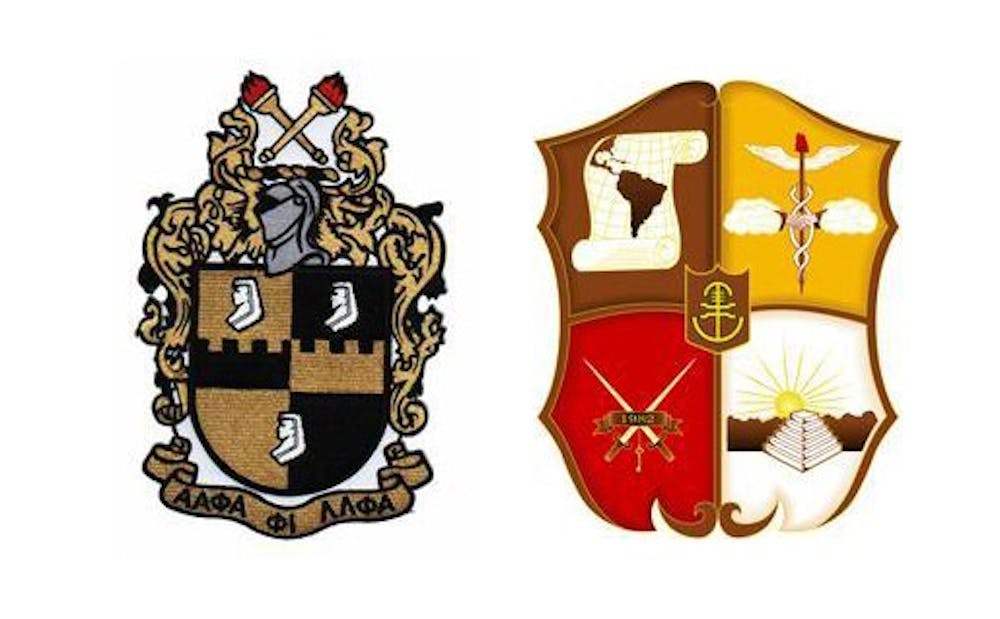Two multicultural fraternities convened a panel Thursday with Duke workers to discuss campus discrimination and draw attention to the contributions of minority labor at the University.
The Sal de la Tierra panel organized by Alpha Phi Alpha and Lambda Upsilon Lambda fraternities called on students to show more appreciation toward black and brown laborers across campus. The four panelists included Michael Eubanks—a Duke transit operator better known as “Big Mike”—and Denise Kinglee, who works in housekeeping at the Old Chemistry building.
The two other panelists spoke on the condition of anonymity for fear of the potential impact of their comments on their jobs. Collectively, the panelists came from the administrative, facilities and transportation departments, and fielded questions from members of the audience about their experiences and thoughts on being people of color at Duke.
“Do you always thank the worker who makes your food on campus?…Do you acknowledge the janitorial staff when you see them in the dorms?” asked junior Travis Smith, a member of the Alpha Phi Alpha fraternity and co-facilitator at the annual Sal de la Tierra—Spanish for "Salt of the Earth"—panel.
In his opening address, Smith highlighted the salience of the panel to current events and to his identity as a Puerto Rican given comments by President Donald Trump that characterized Puerto Rico as constantly asking for handouts in the light of Hurricane Maria.
“I believe that in times like this, especially considering the state of the world and the state of America, it is more than pertinent that this conversation happens, and that we come together as a community and discuss how we as a student body can be more appreciative of our faculty and staff,” Smith said.
Smith posed questions to members of the audience about their interactions with black and brown housekeeping and facilities staff, before allowing the panelists to introduce themselves.
Eubanks, a Durham native who has been a Duke transit operator for nine years, noted that although Duke has advanced substantially, there is still “a lot of work that needs to be done.”
Panelists spoke about their personal experiences of discrimination at Duke. An administrator on the panel who is a person of a color, noted that her credibility has been questioned by people who have failed to acknowledge her expertise, and that she struggles to decide when to advocate for herself and when not to.
“I would encourage everyone to actively fight against that thought if you ever find yourself in that situation because advocating for yourself, asserting yourself is the only way for you to progress and learn and move forward,” she said. “Sometimes we might make mistakes and sometimes people may not like what you say but it’s still worth saying.”
In response to a question posed by sophomore Delmar Kaiser about changes they have seen on campus in relationships between students and staff members, panelists also noted that Duke has hosted fewer initiatives promoting interaction between students and staff in recent years.
“They used to have a luncheon with the students and the employees a couple times a year, sometimes in the Bryan Center,” said one panelist who is an electrician and also wished to remain anonymous. "They haven’t done that in a while."
Panelists also discussed why they chose to work at Duke.
Eubanks explained that he applied just for the opportunity to showcase his skills.
“It’s been nine wonderful years ever since. The staff and students have been very receptive even though I’m not the easiest person to get along with when it comes to putting feet on my seats,” he joked, in reference to students propping their feet on bus seats.
The panelist who works as an administrator added that she was attracted by Duke’s reputation for excellence and the knowledge that the University would constantly push her to improve. Meanwhile, the electrician panelist cited the beautiful campus and the presence of “so many wonderful people,” including men’s basketball coach Mike Krzyzewski.
“Most of all, I love you guys. I have so much respect for you. Soon I’ll be retiring and I’ll miss everybody,” Kinglee said.
Many of the students in the audience were brothers of the hosting fraternities. They, along with non-affiliated students, spoke positively of the event and its impact on them.
“I would say that it’s important that we’re having these kinds of conversations [about] not just what other people can do for us but how we can be in collaboration with people who are here at Duke University, and not only recognizing, but thinking about how we can support them,” said sophomore Ashleigh Smith. “I think it was a really great event to have. Everyone was respected and very interesting.”
Kaiser added that he appreciated the opportunity that the panel presented to gain the perspective of diverse members of the Duke community.
“I obviously think there’s a lot of room for improvement at Duke in the sense that we need to have a lot more of these kinds of interactions, just to learn about their backgrounds and the work that they do and the impact they have on campus,” Kaiser said.
Get The Chronicle straight to your inbox
Signup for our weekly newsletter. Cancel at any time.

